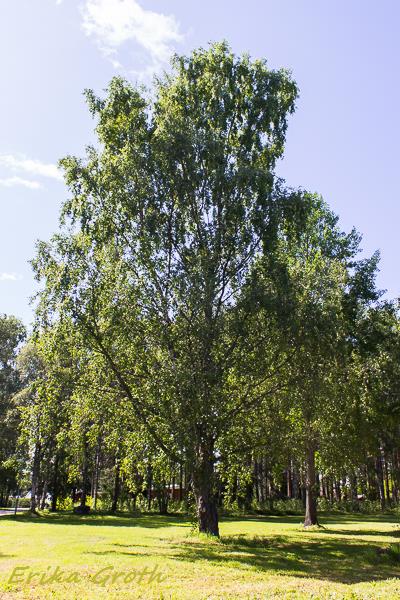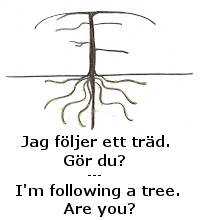
Jag har äntligen semester, vilken jag mest ägnar åt att läsa. Eftersom jag både jobbat heltid och pluggat på halvtid i flera år nu har jag inte haft särskilt mycket tid över till att läsa annat än kurslitteratur så det känns befriande att återigen kunna läsa vad jag vill utan redovisningskrav. Har tagit ut fem veckors sommarsemester i år, vilket är mer än jag brukar ta ut.
Vädret denna sommar växlar mellan varmt och soligt och kyligt men nästan lika torrt. Överhuvudtaget har det regnat väldigt lite. Björken verkar dock inte vara särskilt påverkad av torkan utan ståtar grönklädd.
Även om vi tekniskt sett inte har midnattssol eftersom Luleå ligger söder om polcirkeln har vi den här tiden på året i praktiken ändå ”midnattsdagsljus”. Det är alltså dagsljus ute dygnet runt. Eftersom jag är född och uppvuxen i Norrbotten ingår det, trots att jag även har bott längre söderut, för mig fortfarande i definitionen av hur en normal sommar ska vara. Jag kommer ihåg när jag för första gången reste söder om Sverige, närmare bestämt till Turkiet på en skolresa på högstadiet, och för första gången upplevde mörka kvällar på försommaren, vilket jag uppfattade som konstigt och exotiskt. Jag kommer också ihåg min irritation när biologilärarna på universitetet envisades med att lära ut att växter och djur kräver dygn med både ljus dag och mörk natt för att överleva, vilket ju uppenbarligen är komplett idioti eftersom alla möjliga organismer inklusive både växter och djur överlever såväl mörker dygnet runt som ljus dygnet runt alldeles utmärkt i norr. Jonna Jinton har gjort en av de finaste beskrivningar jag har sett av det fantastiska ljuset här i norr, både sommarljuset och vinterns milda pastelltoner, trots att hon egentligen bor rätt långt söderut och att hennes tips för att överleva vintern inkluderar både vettiga och excentriska förslag. Det skulle ta nästan en hel dag att köra söderut från mig till den ”nordliga” by där Jonna bor, som geografiskt sett ligger i mitten av Sverige, vilket illustrerar det absurda i att nästan hela landet räknas som ”norra Sverige”. Här uppe där jag bor syns inte solen igen efter polarnatten förrän i februari.
******************************************************
IN ENGLISH:
Finally my summer vacation has started, which I mostly spend reading. Since I have been both working full time and studying at part time for several years there’s been little time left for me to read other books than the course litterature so it feels liberating to once again be able to read whatever I want without any requirements to pass exams on the content. This year I take five weeks summer vacation, which is more vacation weeks than I usually use during the summer.
The weather this summer alternates between warm and sunny and chilly but almost as dry. There has been very litte rain overall. The birch does not seem to be affected by the drought though and it stands proud, clothed in green.
Although we don’t technically have midnight sun here since Luleå is south of the Arctic Circle we do in practice have ”midnight-daylight”. In other words it is daylight around the clock. Since I’m born and raised in Norrbotten, the northernmost county in Sweden, this is still a fundamental part of my definition of summer, even though I have also lived further south. I remember the first time I travelled south of Sweden, on a school trip to Turkey when I was 15 years old, and I for the first time experienced dark evenings in early summer, which I found to be really strange and exotic. I also remember my irritation when my biology teachers at university insisted that both daylight and dark nights were absolutely necessary every day for the survival of both plants and animals, which was just plain stupid since all kinds of organisms including both plants and animals survive both daylight around the clock and darkness around the clock just fine for long periods of time in the north. Jonna Jinton has made one of the best descriptions I’ve seen of the amazing light of the north, both the summer light and the soft pastel coloured light of winter, even though she actually lives rather far to the south and her suggestions for surviving the winter are a mix of sensible and eccentric. It would take almost a whole day to drive south from me to the ”northern” village where Jonna lives, in the geographical middle of Sweden, which illustrates how absurd it is that almost all of Sweden is classified as ”northern Sweden”. Up here where I live the sun isn’t visible again until early February after the polar night.
******************************************************
Fotot är taget den 8 juli 2023.
 Kolla även in andra trädföljare på The Squirrelbasket (internationellt).
Kolla även in andra trädföljare på The Squirrelbasket (internationellt).

The tree is still looking lovely.
Thank you so much for sharing the video, which was quite amazing. Seeing no other people in the film made it seem quite post-apocalyptic.
I expect you have made birch-leaf tea?
I envy the idea of seeing so many stars in the winter – here in the city I can still see Orion and the Great Bear, but we have lost the Milky Way and that mass of bright stars that appear when you don’t have light pollution.
All the best for your summer holiday
Thanks.
I’m not a big fan of birch leaf tea. But at least it’s better than that horrible pine needle tea that people usually insist on making when they want to demonstrate what an great outdoors person or nature lover they are.
And it should be said that although the Swedish Right of Public Access gives everyone the right to walk and pick wild berries, mushrooms and flowers anywhere in nature regardless of who owns the land (with a few exceptions), living trees are not included in this right and counts as private property. So taking leaves or shoots from a living tree that you don’t personally own requires the owner’s permission.
In the small rural village where I grew up during the 80s and 90s I could actually see the Milky Way when the nights were dark. I really miss that. Nowadays there is too much light pollution even in most small villages so that only the strongest stars are visible. Today even the northern light is barely visible unless it’s a really strong one. I suspect the problem is that the big breakthrough of LED-lights in the last decade has made covering everything indoors and outdoors in bright lights too cheap. The result is that actual darkness is now almost completely extinct. So the Milky Way is sadly turning into a just a memory of those of us that are old enough to remember it.
Enjoy your summer of reading!
I spent two years in Malawi and it was very strange to have so little variation in day length all year through. In Edinburgh where I live we have very long days in summer (sunrise at the moment is around 5am, sunset around 1030) and of course long nights in winter.
This post reminds me of our time in southeast Alaska, in late May through June. It was ”only” 60º N but it was light through much of the night. I really liked it. We could go to bed whenever we felt like it. When we drove back south and got into Montana, we stopped for a snack and it seemed so odd to have to turn lights on (in the van) to be able to see what we were doing!
It’s a lovely looking tree. Happy reading.
Interesting what you say about the midnight sun and weather there. xx